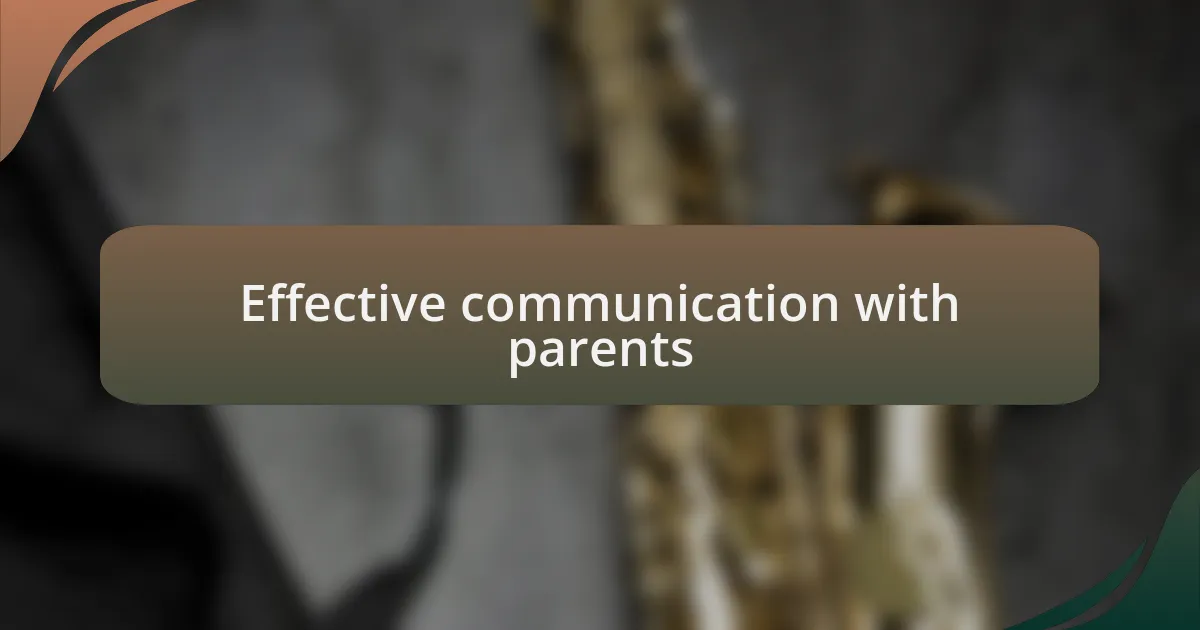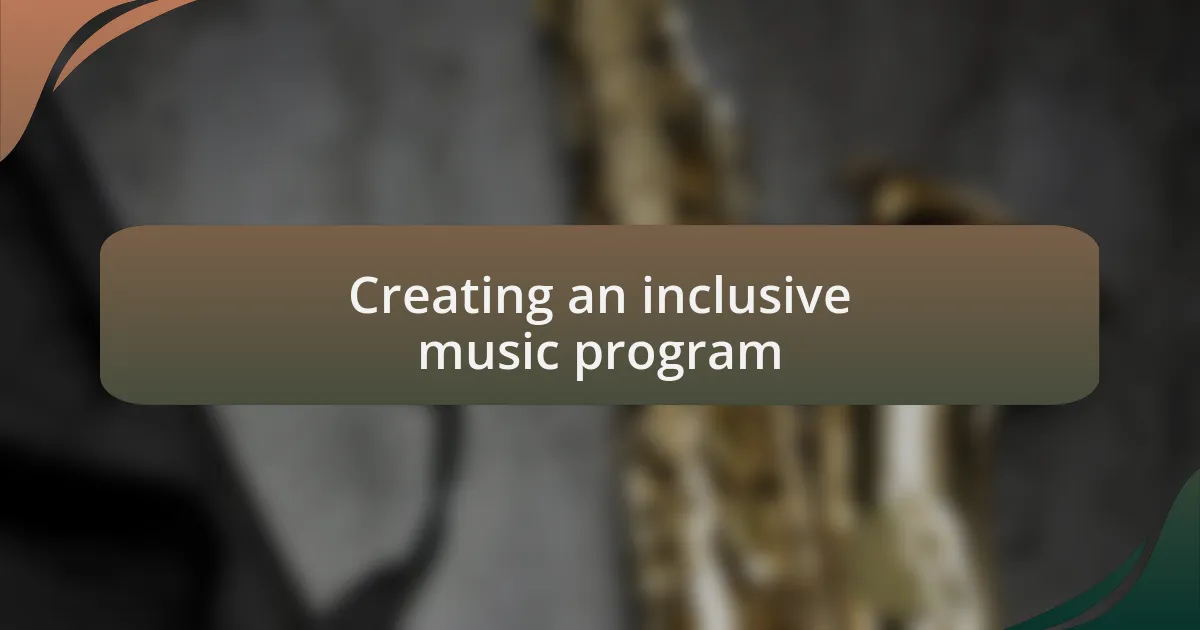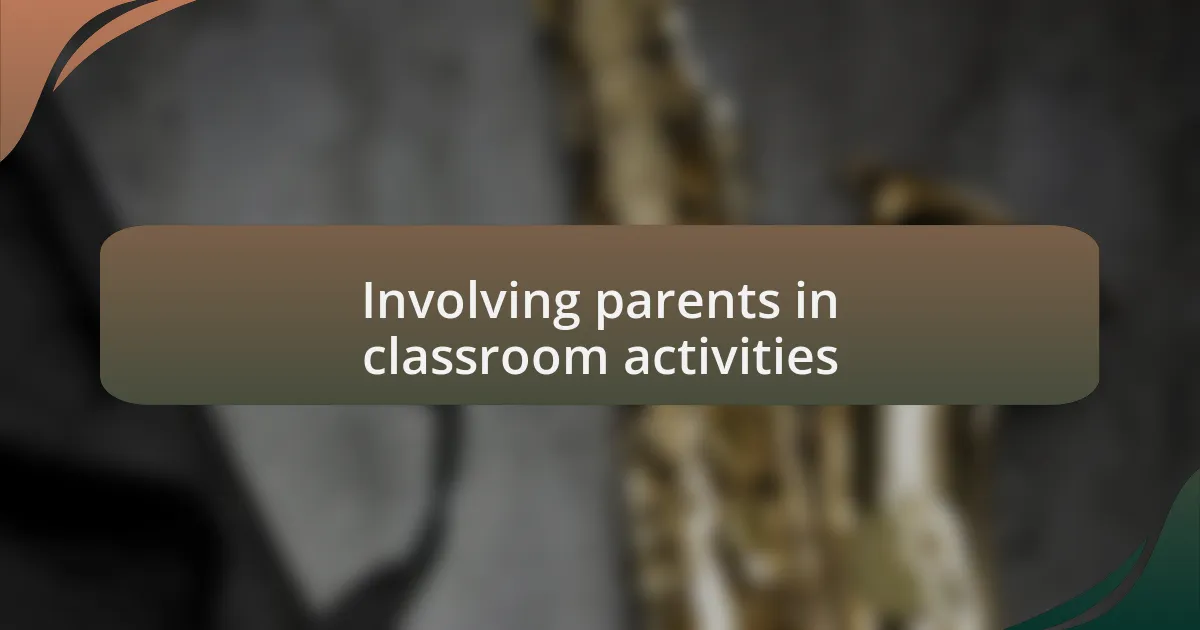Key takeaways:
- Effective communication through regular updates and personal interactions enhances parental engagement and support in children’s musical education.
- Creating inclusive music programs that recognize diverse backgrounds and promote collaboration enriches the learning experience for all students.
- Celebrating student achievements and involving parents in activities fosters a sense of community and strengthens connections between home and school.
- Encouraging parents to participate in decision-making about the curriculum empowers them and makes them feel valued in their child’s education.

Understanding parental engagement strategies
Understanding parental engagement strategies begins with recognizing the unique needs and concerns of each family. I remember a time when a parent approached me after class, expressing her worry about her child’s struggles with practice. This conversation opened a door to deeper engagement, as we worked together to create a home practice routine that was both manageable and enjoyable for her child.
It’s interesting how effective communication can transform relationships with parents. I’ve found that regular updates through newsletters or casual check-ins can make parents feel more connected and involved in their child’s musical journey. How often do we consider that parents, just like students, need encouragement and recognition? When they see progress, no matter how small, it ignites their enthusiasm for continued support.
Additionally, creating opportunities for parents to be actively involved in music-related events can strengthen their investment in the program. I recall hosting a “family jam night” where parents and students played together. The joy and laughter that filled the room were palpable, illustrating how powerful shared experiences can be in fostering deeper connections and engagement. What if we made such events a regular occurrence? The bonds formed there could support our students’ development further, enriching their musical education.

Effective communication with parents
Clear and consistent communication is essential for building a supportive relationship with parents. One of my most rewarding experiences was when I initiated weekly digital check-ins with parents via email. This simple habit not only allowed parents to stay informed about their child’s progress but also served as a platform for them to share their thoughts and concerns. It’s amazing how a few minutes of sharing insights can create a sense of partnership.
I’ve also learned that actively listening to parents can lead to unexpected and valuable insights. During a parent-teacher meeting, one mother shared how her child thrived with visual aids. By collaborating, we developed a personalized approach that integrated these aids into lessons. Isn’t it fascinating how small adjustments can create a ripple effect of improvement in a child’s learning experience?
Moreover, conveying transparency regarding classroom activities and expectations lays a strong foundation of trust. I remember presenting a clear outline of the curriculum at the beginning of the year, followed by an open forum for questions. I noticed that this openness not only alleviated parents’ anxieties but also inspired them to take a more invested role in their child’s music education. How often do we overlook the power of clear communication in fostering a united front in support of our students?

Creating an inclusive music program
Creating an inclusive music program means recognizing the diverse backgrounds and abilities of our students. I remember a specific instance when I decided to incorporate multicultural music into our curriculum. This approach not only celebrated different heritages but also allowed students to see themselves reflected in what they were learning. The joy on their faces when they played a song from their culture was truly heartwarming. How often do we think about the power of representation in music education?
Accessibility is also a crucial component of an inclusive music program. I had the opportunity to work with a visually impaired student, which prompted me to adapt our teaching methods significantly. By introducing tactile instruments and auditory learning techniques, I witnessed firsthand how these adjustments empowered all students to engage with music in meaningful ways. Have you ever thought about how small changes can open large doors for participation?
Lastly, fostering collaboration among students can create a richer learning environment. Group projects that encourage peers to share their musical ideas and experiences have led to some of my most rewarding moments. One time, in a mixed-ability group, a shy student took the lead in arranging a piece they all loved. It was incredible to see how this experience boosted their confidence. How important is it for us to nurture these collaborative experiences in our music classrooms?

Sharing student achievements with parents
Celebrating student achievements with parents is a powerful way to connect home and school. I recall organizing an end-of-semester showcase where students could perform their favorite pieces. The pride on the parents’ faces as they watched their children perform was palpable. It made me realize how important these moments are for building a sense of community and fostering a supportive environment for our young musicians.
When I send home notes highlighting specific accomplishments, from mastering a challenging piece to demonstrating teamwork in group settings, I see immediate reactions from parents. I remember one mother who emailed me, expressing how proud her daughter felt after being recognized. This kind of recognition not only motivates the student but also encourages parents to take an active interest in their child’s musical journey. Have you noticed how a few words of acknowledgment can resonate so deeply with families?
I often use social media to share videos and photos of student performances, extending that celebration beyond the classroom. I remember posting a clip of a student’s solo that went viral among the parents, sparking conversations and excitement within the community. The thrill of seeing their child shine in the spotlight often reinforces their commitment to the music program. It’s fascinating how technology can bridge gaps and keep parents engaged, don’t you think?

Involving parents in classroom activities
Involving parents in classroom activities can significantly enhance their connection to their child’s musical education. When I invite parents to participate in workshops or practice sessions, I’ve noticed how their presence can create a supportive atmosphere. For instance, I once held a “family jam session” where parents joined in playing simple rhythms and melodies alongside their children. The laughter and joy that filled the room were electric, and it was a vivid reminder that music is best experienced together.
I also find great value in parent-teacher meetings that focus on actively engaging these parents in our classroom’s creative process. One time, I had a parent who came to discuss her child’s progress but ended up volunteering to help with a school concert. It was incredible to watch her transform from a spectator to an active participant. This shift not only enriched the event but also allowed her to bond with her child through the music being displayed. How empowering is it when parents see themselves as contributors to their child’s success?
Another strategy I’ve used is to involve parents in decision-making about the music curriculum. Occasionally, I send out surveys to gather their input on what they feel could benefit their children the most in class. I vividly remember the excitement of incorporating a parent’s suggestion for a world music unit, which has since become a favorite amongst students. This sense of shared ownership fosters an environment where parents feel valued and respected, don’t you think?